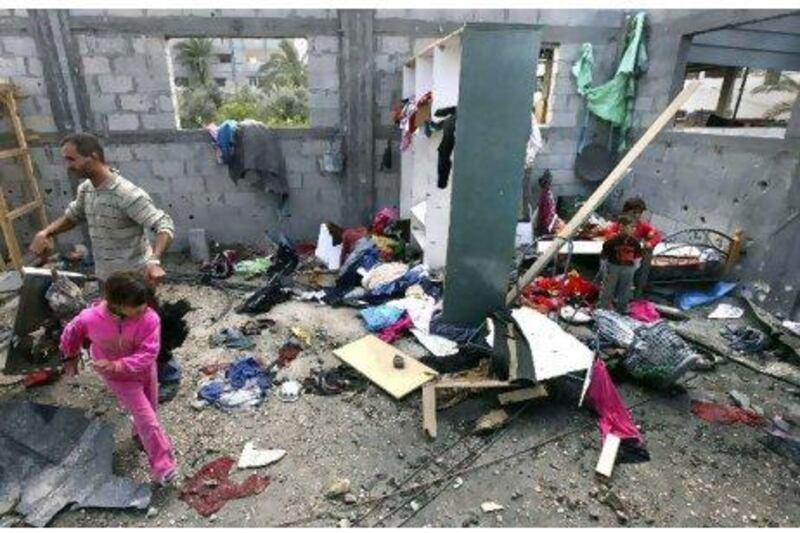GAZA CITY // Yousef Mohammed, 61, is not ready to die by what he and many others in this besieged Palestinian territory cynically regard as little more than a ploy by Hamas.
Militants here have recently been allowed to fire a flurry of rockets deep inside Israel, undermining more than two years of relative calm since the country's three-week military assault on Gaza, Operation Cast Lead, killed as many 1,400 Palestinians. Thirteen Israelis died in the fighting that also obliterated much of Gaza's infrastructure.
If Israel mounts another war, Mr Mohammed, whose home in northern Gaza was levelled during Cast Lead, said the Islamist group would shoulder just as much blame as Israel for the ensuing destruction.
"They're allowing these rockets to be fired and they are willing to sacrifice the people for their political agenda," he said as one of Israel's pilotless drones buzzed overhead - just as they had done before the war started in December 2008.
"This is political. But for us, all this means is death, no jobs, no end to Israel's siege."
Gazans such as Mr Mohammed, analysts and long-time observers here view the surge in rocket attacks with deep scepticism.
Rather than resistance, they say, it is a deliberate attempt by Hamas to nip in the bud tenuous attempts made recently at reconciling its relations with its Palestinian rival, Fatah. The two fell out after Hamas overran Fatah forces here in 2007 and have failed ever since to mend their relationship.
"Hamas thinks it has too much to lose by giving up power in some sort of unity government and elections that would result from reconciliation," said Akram Attallah, a columnist for Al Ayyam newspaper who lives in Gaza.
"They think their regional circumstances are improving now that a new government in Egypt may loosen the blockade on Gaza. They are more than happy to wait things out and see."
To do this, he and others accused Hamas of resorting to a time-tested strategy: turning attention towards Israel by allowing militants to goad its powerful military into attacking with barrages of Qassam and Grad rockets.
"There is no doubt that 100 per cent of the Palestinians, the unions, the NGOs - all of them know that Hamas is provoking Israel because this will halt the reconciliation talks," said Mohammed Hejazi, an expert on political Islam who lives in Gaza city.
"They don't care if people die as a result."
He said there was suspicion that both Israel and Hamas realise a common cause in opposing Palestinian reconciliation. Israel's prime minister, Benjamin Netanyahu, rejected the idea in an interview earlier this month, saying: "Can you imagine a peace deal with al Qa'eda? Of course not."
Mr Hejazi said: "Israel knows these attacks were used by Hamas for domestic consumption. And Hamas knows this situation benefits Israel's interests."
He added that there seemed to be an attempt by both sides not to target people, evidenced by the tendency of projectiles fired on either side of the divide to strike open fields and empty buildings.
Fuelling the cynicism is a widespread belief that senior Hamas figures went into hiding after more than 50 missiles were launched into Israel last Saturday. Few, if any, could be reached for interview over the last several days.
Fadia Moushtaha, 33, a mother of four boys and two young girls, is one of those who believes she has suffered from Israeli retaliation while Hamas officials hide safely in their undisclosed bunkers.
"Why is it that when they launch rockets near our homes and then go hide somewhere, we are left to face Israel and its weapons?" she said as she surveyed what once was the first storey of her family home in Gaza City, destroyed on Tuesday afternoon by an Israeli mortar.
"For too long, we've had to suffer from this."
She said she and her family narrowly escaped. Their neighbours were not so lucky, however. Three of them died in the attack, including Yasser al Helou, 58, who was said to actively oppose militants attempting to fire rockets at Israel from their neighbourhood. In fact, she said, al Helou had just scolded militants after they launched rockets from a nearby field of olive trees when an Israeli mortar killed him, a grandson and a nephew.
"Shame on Hamas," Ms Moushtaha said.
Earlier this month, hopes were lifted when leaders from Hamas and Fatah expressed their willingness to end the divide following large street demonstrations in Gaza and the West Bank calling for Palestinian unity.
Ismail Haniyeh, the Hamas prime minister, asked his rival in the West Bank, Mahmoud Abbas, the Palestinian Authority (PA) president, to "an immediate" meeting "to start national dialogue in order to achieve reconciliation". Not to be outdone, Mr Abbas upped the ante the following day, saying he was "ready to go to Gaza tomorrow in order to end the division". His offer was accepted, although tentatively.
Since then, progress has sputtered with Hamas officials issuing a number preconditions for Mr Abbas' now uncertain visit here that many in Fatah consider unacceptable.
It is unclear if Mr Haniyeh had received internal backing from top Hamas leaders before he issued his invitiation.
Suhail Jaber, a prominent Fatah member in Gaza, said he thought this was evidence of Hamas having been taken by surprise with Mr Abbas's proposed visit to Gaza. This may also have had the unintended effect of convincing the group to initiate attacks that could spiral out of control.
But, he said: "The people know this isn't a matter of resisting Israel. It's a game and nobody is fooled."
Back in his home, Yousef Mohammed prepared to wait through another evening that he hoped would not descend into all-out war with Israel.
"Really, all we want is peace between Hamas and Abu Mazen, elections, a new government," he said, calling Mr Abbas by his nickname.
Then he pointed to the Israeli drone hovering overhead, saying: "We don't want anymore resistance. Too many problems."





